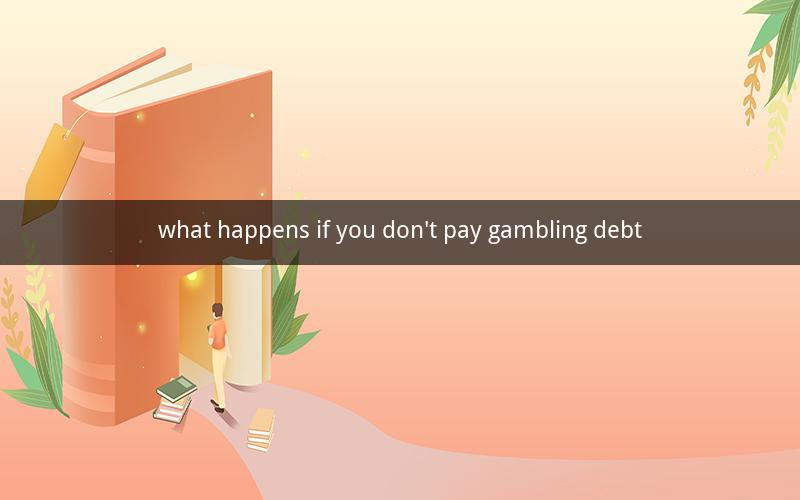
Table of Contents
1. Understanding Gambling Debt
2. Consequences of Non-Payment
3. Legal Implications
4. Financial and Emotional Impact
5. Debt Collection and Enforcement
6. Debt Management Strategies
7. Debt Counseling and Support
8. The Role of Creditors
9. Bankruptcy as an Option
10. Prevention and Responsibility
1. Understanding Gambling Debt
Gambling debt, often characterized by its insidious nature, can arise from a variety of situations. It can stem from a single, impulsive bet or accumulate over time from repeated losses. Regardless of its origin, the reality of owing money to a gambling establishment is a daunting prospect for many individuals.
2. Consequences of Non-Payment
When individuals fail to pay their gambling debts, a series of consequences can unfold. These include:
- Collection Efforts: Creditors may employ various methods to recover the debt, ranging from polite reminders to aggressive collection tactics.
- Legal Actions: In some cases, creditors may resort to legal action, leading to judgments and potentially seizure of assets.
- Credit Score Impact: Non-payment can significantly damage an individual's credit score, making it difficult to secure loans or credit in the future.
- Stress and Anxiety: The emotional toll of debt can be immense, leading to stress, anxiety, and even depression.
3. Legal Implications
The legal implications of non-payment can vary depending on the jurisdiction and the nature of the debt. In some cases, gambling debts may not be legally enforceable, while in others, they can be treated like any other debt. It is crucial for individuals to understand the legal framework surrounding gambling debts in their region.
4. Financial and Emotional Impact
The financial impact of gambling debt can be severe, leading to financial instability and potential eviction or foreclosure. Emotionally, the pressure to pay off the debt can be overwhelming, affecting relationships, work performance, and overall well-being.
5. Debt Collection and Enforcement
Debt collectors may employ various tactics to recover debts, including phone calls, letters, and even home visits. In some cases, they may also threaten legal action. It is important for individuals to know their rights and respond appropriately to these tactics.
6. Debt Management Strategies
Effective debt management strategies can help individuals navigate the challenges of gambling debt. These may include:
- Budgeting: Creating a realistic budget to manage existing expenses and allocate funds towards debt repayment.
- Prioritizing Debts: Focusing on high-interest debts first to minimize the overall cost of borrowing.
- Seeking Professional Help: Consulting with a financial advisor or credit counselor for personalized advice and support.
7. Debt Counseling and Support
Debt counseling services can provide individuals with the tools and resources needed to overcome gambling debt. These services may include:
- Financial Education: Learning how to manage money more effectively and avoid future debt.
- Behavioral Therapy: Addressing the underlying issues that contribute to gambling addiction.
- Support Groups: Connecting with others who have experienced similar challenges and sharing coping strategies.
8. The Role of Creditors
Creditors have a responsibility to treat individuals fairly and ethically. This includes providing clear information about the debt, offering reasonable repayment plans, and avoiding excessive harassment.
9. Bankruptcy as an Option
In some cases, bankruptcy may be an option for individuals overwhelmed by gambling debt. This legal process can provide relief from debt and a fresh start, although it has significant long-term consequences.
10. Prevention and Responsibility
Preventing gambling debt requires a combination of self-discipline, financial education, and support from friends and family. Individuals should:
- Set Limits: Establish clear limits on gambling activities and stick to them.
- Seek Support: Reach out to friends, family, or support groups for help and encouragement.
- Educate Themselves: Learn about the risks and consequences of gambling and develop responsible habits.
Questions and Answers
1. What is the most common reason for not paying gambling debt?
- The most common reason for not paying gambling debt is the inability to afford the debt due to financial constraints.
2. Can gambling debts be discharged in bankruptcy?
- Whether gambling debts can be discharged in bankruptcy depends on the jurisdiction and the nature of the debt.
3. How can I stop a debt collector from contacting me?
- You can stop a debt collector from contacting you by sending a written request to cease communication.
4. What should I do if I am unable to pay my gambling debt?
- If you are unable to pay your gambling debt, it is important to communicate with your creditors and seek assistance from a credit counselor or financial advisor.
5. Can I be arrested for not paying a gambling debt?
- In most jurisdictions, you cannot be arrested for not paying a gambling debt, as it is considered a civil matter rather than a criminal offense.
6. How can I rebuild my credit score after defaulting on a gambling debt?
- Rebuilding your credit score after defaulting on a gambling debt requires time, discipline, and responsible financial behavior.
7. What is the difference between a gambling debt and a credit card debt?
- The main difference between a gambling debt and a credit card debt is the nature of the debt, with gambling debts often being considered unenforceable in some jurisdictions.
8. Can I negotiate a payment plan with my creditors for a gambling debt?
- Yes, you can negotiate a payment plan with your creditors for a gambling debt, although the success of this negotiation depends on the willingness of the creditors.
9. How can I avoid falling into gambling debt in the future?
- To avoid falling into gambling debt in the future, it is important to set limits, seek support, and educate yourself about the risks and consequences of gambling.
10. What is the most effective way to deal with gambling debt?
- The most effective way to deal with gambling debt is to seek professional help, develop a debt management plan, and address the underlying issues that contribute to gambling addiction.